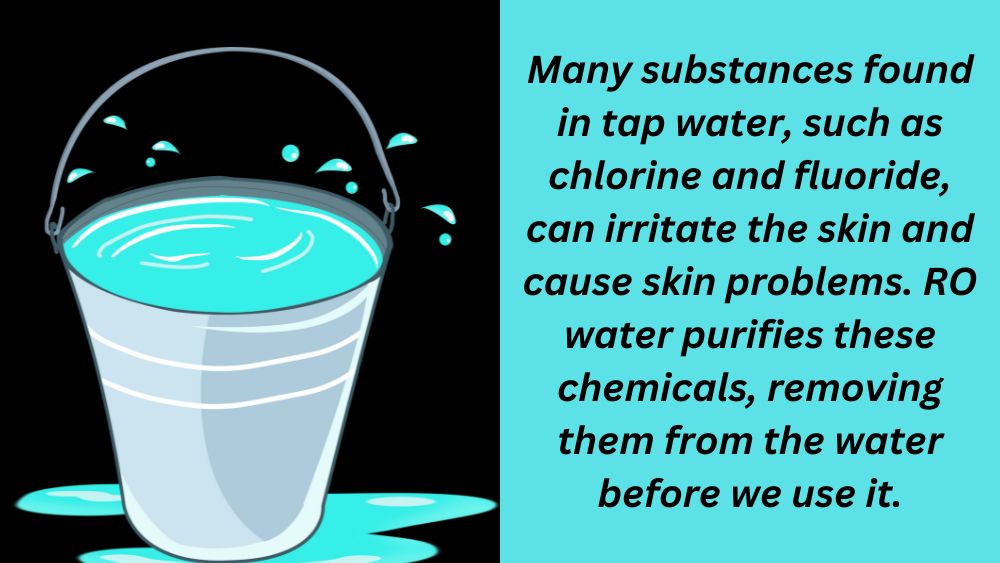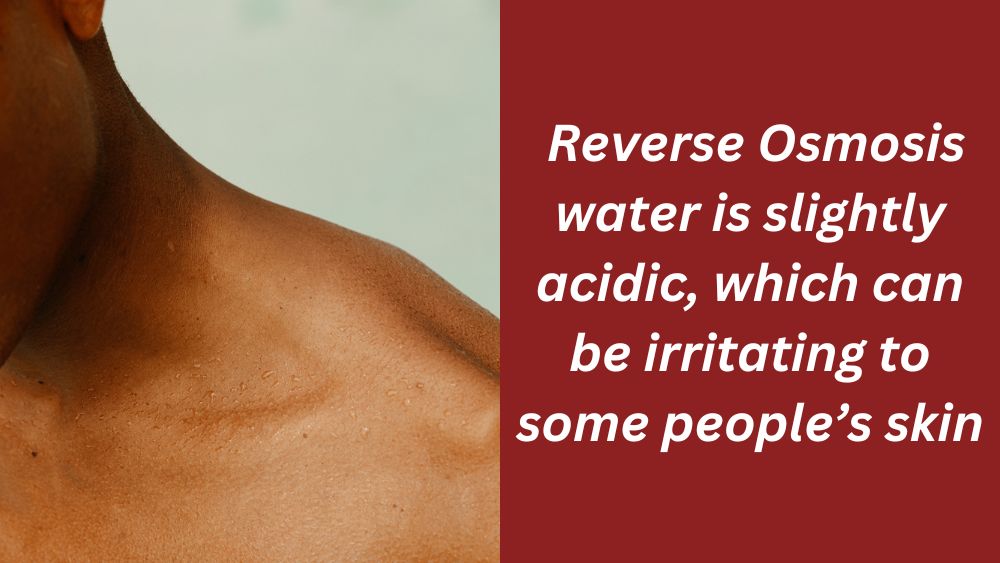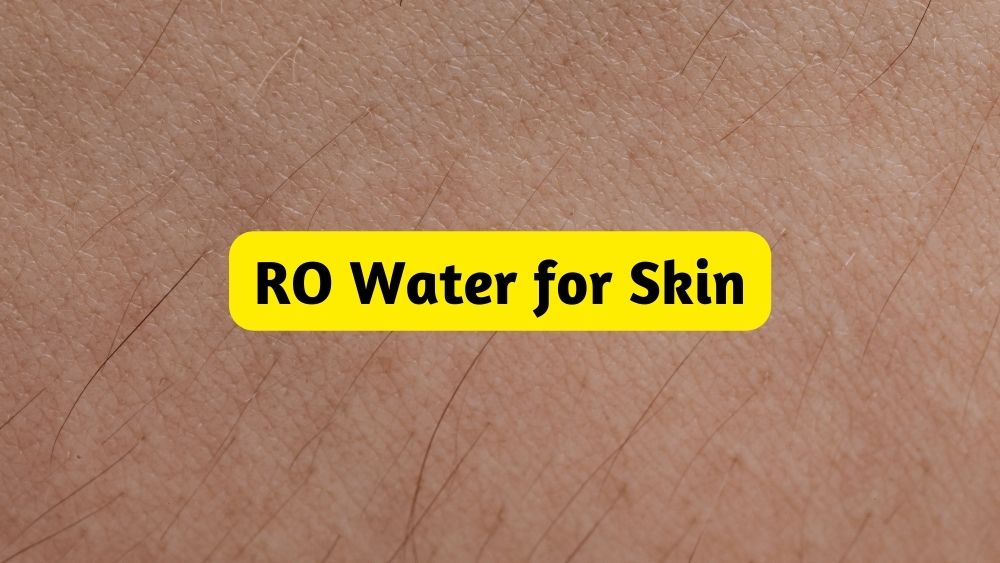Pollutants, chemicals, and other environmental factors can irritate and inflame our skin. With the increasing prevalence of skin conditions like eczema, dermatitis, and psoriasis, finding a way to keep our skin healthy and hydrated is a priority.
RO is a water purification system that removes impurities from water, making it suitable for drinking, cooking, and other activities. A million-dollar question, Is RO water good for the skin?
This blog post (A unique research by Hasan Al Sarker) will examine the benefits and drawbacks of using RO water for skin care and identify its potential risks. We will also review the evidence-based research that supports the use of Reverse Osmosis water in skin care. By the end of this blog post, you will better understand how RO water can help healthy skin and how you should use it safely.
RO Water for Skincare
Regarding our Skincare, reverse osmosis (RO) water is gaining popularity due to its many potential benefits. RO system removes impurities, such as bacteria, lead, chlorine, and other contaminants from water.
The RO-purified water is free of undesirable elements and is said to be beneficial for skin health. RO water is also said to be more hydrating than tap water and is helpful for the skin.
Benefits of RO Water for Skin
There are many significant reasons we can use RO water for our skin. Besides the body, we can also use RO water for our faces.
- One of the significant benefits of RO water for the skin is that it helps to reduce the effects of harsh chemicals and toxins on the skin.
- Many substances found in tap water, such as chlorine and fluoride, can irritate the skin and cause skin problems. RO water purifies these chemicals, removing them from the water before we consume it. This helps reduce the number of toxins absorbed through the skin and helps keep it healthy.
- Additionally, by removing harmful bacteria, RO water can help reduce acne and other skin blemishes. The purified water is also known to leave the skin feeling soft and hydrated, giving it a healthier glow.

Ways to Use RO Water for Skin
Is RO water suitable for the skin? The answer is yes! Reverse Osmosis water is free from chemicals, zinc, heavy metals, and other contaminants. That is why RO water can benefit our skin in multiple ways. Here are four of the best ways to use RO water for skin-
Use it in your skincare routine
RO water can be used as a base for making a homemade face mask, cleanser, or toner. It is also an excellent substitute for tap water when you’re washing your face.
Use it for a refreshing mist
Use RO water in a spray bottle throughout the day to boost hydration and keep your skin looking healthy and radiant.
Replenish your skin
After cleansing, use RO water to help restore any moisture that we lost due to washing.
Use it in your bath
Fill your bath with RO water to soothe sun-exposed or other environmentally damaged skin. The water will help replenish your skin’s natural oils and leave it feeling hydrated and refreshed.
Disadvantages of Using RO Water for the Skin
98% of people are happy with using RO water for their skin. However, there are some potential drawbacks to using this type of water. Reverse osmosis water is highly purified, meaning it has had many minerals and other beneficial elements stripped away. This can leave the skin feeling dry and lacking essential nutrients.
Additionally, reverse osmosis water is slightly acidic, which can be irritating to some people’s skin. Lastly, a reverse osmosis system can be expensive to purchase and maintain. Therefore, it is essential to consider all the potential drawbacks before using reverse osmosis water for the skin.
Reverse Osmosis Water for the Face
Reverse osmosis water is an increasingly popular choice for facial cleansing and toning. Reverse osmosis water is ideal for facial cleansing because it is gentler on the skin than regular tap water and free from any added chemicals or minerals that irritate.
Many skincare experts recommend using reverse osmosis water for the face as it is free from impurities and helps to protect the skin’s natural moisture barrier. It is also an excellent choice for those who suffer from oily skin.

Drinking Enough Water for Beautiful Skin
Water is essential for obtaining beautiful skin. Drinking enough water, especially with a balanced diet and regular exercise, will help keep your skin hydrated from the inside out. Water-based skin care products, such as cleansers, toners, and moisturizers, help remove dirt and debris, balance natural oils, and create a protective barrier for your skin.
Using lukewarm water to cleanse the skin and removing all traces of soap with cool water helps to keep the skin balanced and healthy. Always apply sunscreen when outdoors, as UV rays can damage the skin and cause premature aging. Water is an excellent treatment to help maintain beautiful skin, and you can benefit from a glowing, hydrated complexion with regular use.
Is UV Water Good for the Skin?
There are no ways to prove that only UV light is good or bad for the skin. But we can only say that UV-filtered water is germ-free. So UV light-filtered water prevents growing germs in our skin.
Ultraviolet (UV) water is a type of sterilized water that has been exposed to ultraviolet (UV) light. There are points to be noted; when we use UV light without an RO system, then it won’t be able to remove heavy metals. But UV light surely destroys microorganisms. It will be better if a UV filter is used after the RO system.
Is it OK to Bath with RO Water?
If we do not have skin diseases, we can bathe with RO water. Bathing with RO water does not harm the skin. RO water is known for its purity and for removing many impurities, so it is safe for bathing.
However, the lack of minerals in RO water could lead to dryness and irritation for sensitive skin. So it is essential to use a moisturizer afterward. Additionally, those with skin conditions like eczema should consult their doctor before bathing with RO water, as it could worsen the situation.
Benefits of Shower Filter (Without RO System) for Bathing
Shower filters are an effective way to protect against the harmful effects of hard water. Having hard water can irritate and dry out our skin and hair. Also, it increases the risk of developing rashes.
- We can use a shower filter to reduce the amount of chlorine, sediment, and heavy metals in the water. Also, shower filters improve the water quality and provide a better bathing experience.
- Additionally, shower filters can help reduce the amount of soap and shampoo residue, as well as other contaminants, that can remain on the skin and hair after bathing. Shower filters can provide a softer and smoother feeling to the skin and hair, leaving it looking and feeling healthier.
- Furthermore, they can reduce the time it takes to rinse off the soap, reducing water consumption and energy costs. Shower filters can offer various benefits, making them a great addition to any bathroom.
Is Tap Water Good for the Human Skin?
We generally use tap water for our skin. But have we ever considered how safe tap water is for our skin? Tap water is usually considered safe on the skin with few adverse effects. However, it can contain various minerals and chemicals that may irritate some skin types.
The primary chemical of concern in tap water is chlorine, which is used to disinfect the water to prevent the spread of bacteria and other pathogens. For those with sensitive or dry skin, it is recommended to use RO-filtered water instead, as it can help remove chlorine and other contaminants in tap water.
Additionally, we can use shower filters to help reduce the amount of chlorine and other chemicals that come in contact with the skin. Overall, tap water is generally safe to use on the skin, though it is recommended to use filtered water for the best possible result.
Final Words
Those who use RO water have reviewed that it is the best water for the skin. Also, RO water is suitable for 99% of people’s skin. Ultimately, the best way to determine which water is best for you is to speak with a dermatologist who can provide personalized advice.

Hasan Al Sarker is a Reverse Osmosis Specialist. He has worked for many years to ensure safe drinking water for all. His research paper has been published in several journals, including Issue, Medium, and Slideshare. He is recognized as a water doctor among specialists though he did not attend medical college.
Besides working as a researcher of reverse osmosis technology, he is also very fancy with the kitchen and cooking. His guides are reading thousands of people every day. As a head of content, he is responsible for all the published articles at RO System Reviews.

